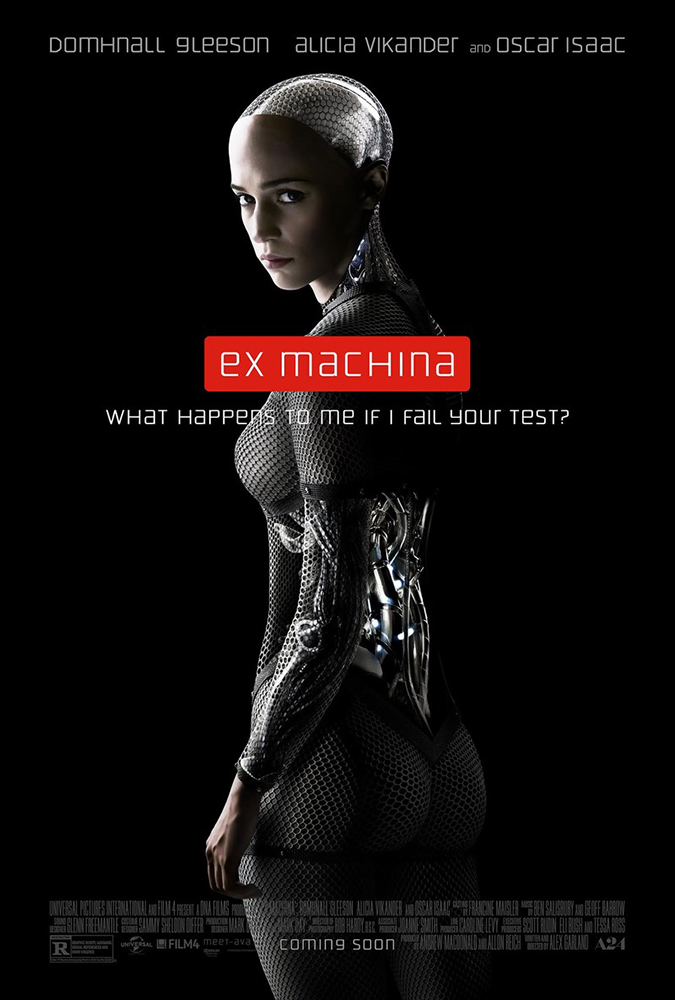As technology and science have developed faster than our ability to analyze their consequences, the culture at large has become obsessed with issues of artificial intelligence. The ever-encroaching dawn of singularity — the belief that artificial intelligence will one day exceed past human intelligence and control — terrifies and fascinates anyone looking toward the future of civilization in a globalized world. Clearly, Hollywood has taken notice, churning out a mixed-bag of stories attempting to wrestle with the subject in either a dystopian or utopian manner, such as “Her,” “Transcendence” and “Prometheus.”
“Ex Machina,” the directorial debut of sci-fi mastermind Alex Garland (“28 Days Later,” “Sunshine” and “Never Let Me Go”), wishes to enter the debate, albeit with a twist. More psychological thriller than sci-fi drama, the chamber piece focuses on an earnest programmer named Caleb, who has won the opportunity to spend a week at his employer’s compound in the backcountry of Alaska. Nathan, the commanding and bro-ed out CEO of tech-giant BlueBook, has different plans for Caleb once he arrives. Instead of just hanging out with a few beers and morning hikes, the fresh-faced computer-geek is recruited as the human component in a Turing Test for Nathan’s top-secret AI project, under the guise of a mother-load of NDAs. Named after computer pioneer Alan Turing (the subject of last year’s “The Imitation Game”), the Turing Test is designed to examine if an AI exhibits intelligence and behavior indistinguishable from that of a human — the destruction of the line between man and machine.
The film crafts a single miracle: Ava — the beautiful, hyper-aware and enigmatic AI creation at the heart of the film. Swedish actress Alicia Vikander is shouldered with the toughest job, a human playing a robot that almost passes as a human — a sleek glass and neon-wired cranium and torso punctuating her otherwise flawless human body. Might as well be Apple’s iHuman. Her speech and movements are precise and perfect — too perfect for a real human, leading to the uncanny valley effect popularized by motion capture animation. Trained as a ballerina, she floats when someone would be content with walking. Tasked with undergoing one-on-one conversations with Ava, Caleb becomes enamored, especially when engaging in emotional intimacy that transforms into subtle sexual tension. And when Ava drops the bomb — that the megalomaniac Nathan is holding her prisoner and tormenting past AI’s — Caleb is caught in an ethical dilemma that shakes his entire belief about what makes us human.
Despite posing several intriguing questions about the necessities and proclivities of humanity, “Ex Machina” shines when exploring the nature of awareness. Caleb is aware he is taking part in the Turing Test, Ava is aware she is a robot and Nathan is more than aware of certain avenues Ava will go down to convince Caleb of her intentions. But as the lines of loyalty are constantly blurred and motivations render themselves murkier than meets the eye, whom can Caleb believe — the secretive and overbearing Nathan or the girl with the heart of hardware and the emotions of a potential lover?
And that is where the core of the issues lies. Humans are manipulative creatures, using speech, physicality, empathy and sexuality to achieve our goals and communicate our identity. The brilliance of Garland exudes in his ability to manipulate the audience into states of seeming enlightenment and then pull the rug out from under us when it reveals to all be a lie. At its core, the heart is deceptive — and that is exactly what makes us human.







